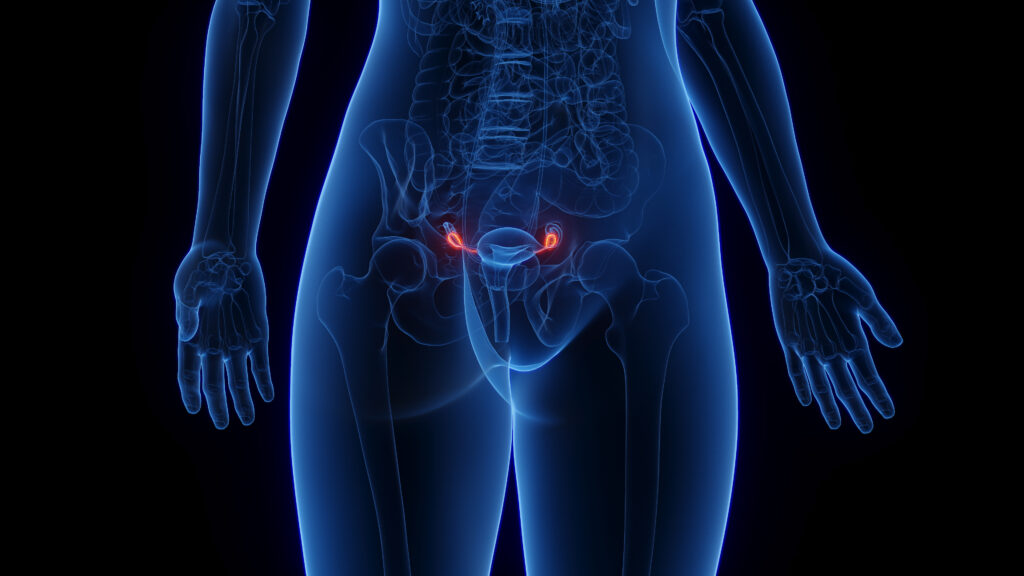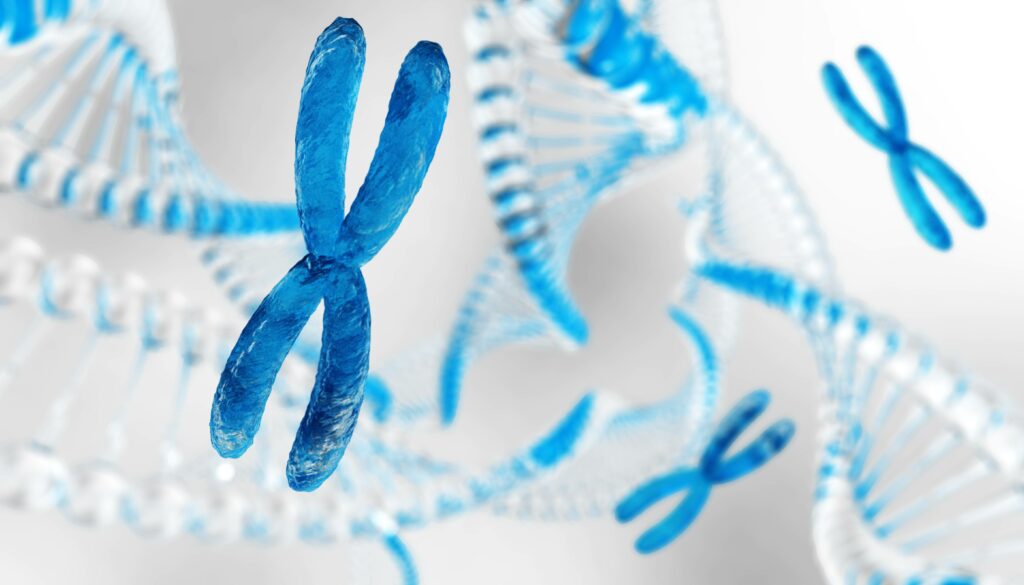I am often asked why autoimmune diseases affect women more than men. Thanks to new research, we finally have a concrete answer. Autoimmune diseases are medical conditions that occur when your body’s immune system incorrectly attacks your own cells and tissues. You might recognize names such as Graves’ disease, celiac disease, lupus, multiple sclerosis, and rheumatoid arthritis. Alarmingly, these conditions seem to favor women, with a whopping 78% of those afflicted being female. In fact, autoimmune diseases now rank as the fifth major cause of death for women under 65 years old.1 2

The primary reasons why women are more susceptible to autoimmune diseases are due to the influence of female sex hormones and the X chromosomes. Sex hormones, including estrogen, progesterone, and testosterone have a significant influence on autoimmunity.
Estrogen, the primary female hormone, has a hand in escalating autoimmune diseases. Studies show that women with autoimmune diseases tend to have more severe symptoms during certain phases of their menstrual cycle when estrogen levels are high. Estrogen can directly tweak the functionality of genes involved in immunity and kickstart B cells, which churn out antibodies that often attack the body’s own cells.3
There are three main types of estrogen in the human body: estrone (E1), estradiol (E2), and estriol (E3). They are all produced in different amounts and have different functions.
E1 is primarily produced after menopause and helps maintain bone density. E2 is the most common type of estrogen in premenopausal women. It plays a crucial role in reproductive health, but also affects other organs, such as the brain and heart. E3 is mainly produced during pregnancy. It helps support fetal development and can also have anti-inflammatory properties.4
Increased levels of E2 have been linked to the development of systemic lupus erythematosus (SLE), an autoimmune disease that affects multiple organs and systems in the body. This is because E2 activates immune cells and increases inflammation in the body.5 Low levels of E3 during pregnancy have been associated with an increased risk of autoimmune diseases in both the mother and child.6

Progesterone
Progesterone is a hormone that plays an important role in regulating the female reproductive system. It is primarily produced by the ovaries, but can also be produced by the adrenal glands and placenta during pregnancy.7
While progesterone is mainly known for its role in preparing the uterus for pregnancy and maintaining a healthy pregnancy, it also has other functions in the body. One such function is its role in modulating the immune system.8
Studies have shown that progesterone can have both anti-inflammatory and immunosuppressive effects on the body. This means it can help reduce inflammation and suppress the immune response. These effects are beneficial during pregnancy to prevent the mother’s body from rejecting the fetus, which has genetic material from the father and could otherwise be recognized as a foreign entity by the immune system.9
However, these same effects on the immune system also lead to an increased risk of developing autoimmune conditions. Progesterone has been found to sway the immune response, leaning it towards creating more antibodies and autoantibodies. Research has linked progesterone levels to certain autoimmune conditions, such as lupus, rheumatoid arthritis, and multiple sclerosis.
It is believed that fluctuating levels of progesterone during a woman’s menstrual cycle has the potential to trigger autoimmune reactions in susceptible individuals. Excess progesterone impairs immune system functioning and often leads to the development of autoimmune diseases.10
Lower Levels Of Testosterone
Testosterone, a male hormone, has immunosuppressive effects that offer protection from autoimmune diseases. Studies have shown that men, who naturally have higher levels of testosterone, are less likely to develop certain autoimmune diseases such as rheumatoid arthritis and multiple sclerosis.11
Testosterone has been shown to have anti-inflammatory properties. Studies have found that testosterone supports the production of regulatory T cells, which play a crucial role in maintaining immune balance and preventing autoimmune responses.12
Interestingly, women with polycystic ovary syndrome (PCOS), a condition characterized by high levels of male hormones, have a higher risk of developing autoimmune disorders. In other words, increasing testosterone levels in women doesn’t appear to offer protection from autoimmune conditions so there are many other factors at play.13 14
X Chromosomes
Women’s genetic makeup, particularly the possession of two X chromosomes, is another piece in this puzzle. X chromosomes contain a large number of genes related to immune function. Typically, one X chromosome in each cell is ‘switched off,’ but intriguing recent findings show that some genes on the supposed ‘switched off’ X chromosome can still be active.15
This heightened activity leads to a surplus of specific proteins in women compared to men, fueling autoimmune responses. Conditions that result in an abnormal number of X chromosomes, like Klinefelter’s syndrome or trisomy X, have been linked to an even higher risk of autoimmune diseases.16 17

Female Gut Microbiome
Another unexpected player in this scenario is the gut microbiome which is the ecosystem of bacteria that make a home in our intestines. Lab studies on mice have demonstrated that shifts in gut bacteria can sway the development of autoimmune diseases.18
Furthermore, the composition of gut bacteria varies between males and females. This gender variation in gut bacteria might play a protective role against autoimmune diseases in males, possibly due to the influence of testosterone levels.19
Studies have shown that women with autoimmune diseases have imbalances in their gut microbiome. They tend to have lower levels of beneficial bacteria and higher levels of harmful bacteria compared to healthy individuals. This imbalance, also known as dysbiosis, leads to chronic inflammation and a weakened immune system.
When there is an imbalance in the gut microbiome, it often triggers an inappropriate immune response leading to autoimmune conditions. Additionally, certain strains of bacteria in the gut have been found to directly contribute to the development of autoimmune diseases by producing toxins or causing damage to intestinal cells.20
Read more about how to improve the gut microbiome.
Environmental Factors
When it comes down to it, it is not just a matter of genes and hormones. The environment we live in also plays a key role. Exposure to microbial infections, chemicals, heavy metals, mold toxins, smoking, dietary factors, and stress impact the likelihood of developing autoimmune diseases.21
Targeting The Environmental Causes Of Autoimmune Conditions
While genetics play a role in predisposing individuals to autoimmune diseases, we don’t have much control over that at the moment. What we can do is focus on environmental factors that are linked to the development of autoimmune diseases.
One major environmental factor that has been linked to autoimmune conditions is exposure to toxins. Toxins come in many forms, including heavy metals, mold, hidden infections, and chemicals. These toxins are all around us and enter the body through various routes such as ingestion, inhalation, or absorption through the skin.
Heavy Metals
Heavy metals, such as lead, mercury, and cadmium, are known to be harmful to our bodies in high doses. However, even low levels of exposure over time can accumulate and cause damage to our cells and tissues, leading to chronic inflammation and autoimmune diseases.22
Heavy metals induce oxidative stress, leading to an inflammatory response in the body. This reaction activates immune cells and promotes the production of autoantibodies, causing damage to healthy tissues.23
One example of a heavy metal associated with autoimmune diseases is mercury. Mercury exposure has been linked to the development of systemic lupus erythematosus. Mercury induces oxidative stress and alters immune cell function, leading to the production of autoantibodies involved in SLE.24
Another heavy metal of concern is lead, which has been linked to the development of rheumatoid arthritis. Studies have shown that exposure to lead affects immune cell function and increase inflammatory responses in the body, contributing to RA development.25
Read more about the toxic effects of heavy metals.
Toxic Mold
Mold exposure is another significant factor in the development of autoimmune conditions. Mold produces mycotoxins, which are toxic substances that can wreak havoc on our immune system. In addition to causing respiratory issues and allergies, mold exposure has been linked to autoimmune diseases such as lupus, rheumatoid arthritis, and multiple sclerosis.26
Read more about the toxic effects of mold.

Hidden Infections
Hidden infections are also a common trigger for autoimmune conditions. These can include bacterial, viral, or parasitic infections that may go undetected for years and cause chronic inflammation in the body. The constant activation of the immune system in response to these hidden infections often leads to the development of autoimmune diseases.27
Everyday Chemicals
Chemicals found in everyday products such as cleaning supplies, personal care products, and pesticides have also been linked to autoimmune conditions. These chemicals disrupt the balance of our hormones and immune system, leading to chronic inflammation and autoimmune diseases.28
Read more about common toxins we are exposed to.
78% Of Autoimmune Conditions Affect Women
Autoimmune diseases affect women more than men, with 78% of sufferers being female. The reasons span a complex meshwork of genetics, hormones, gut bacteria, and environmental influences. The interplay between these factors negatively affects the immune system, leading to the development of autoimmune diseases.
Read more about autoimmune conditions.
References
1 Moyer, M. W. (2022, March 23). Why nearly 80 percent of autoimmune sufferers are female. Scientific American. https://www.scientificamerican.com/article/why-nearly-80-percent-of-autoimmune-sufferers-are-female/
2 Angum F, Khan T, Kaler J, Siddiqui L, Hussain A. The Prevalence of Autoimmune Disorders in Women: A Narrative Review. Cureus. 2020 May 13;12(5):e8094. doi: 10.7759/cureus.8094. PMID: 32542149; PMCID: PMC7292717.
3 Desai MK, Brinton RD. Autoimmune Disease in Women: Endocrine Transition and Risk Across the Lifespan. Front Endocrinol (Lausanne). 2019 Apr 29;10:265. doi: 10.3389/fendo.2019.00265. PMID: 31110493; PMCID: PMC6501433.
4 Emmanuelle NE, Marie-Cécile V, Florence T, Jean-François A, Françoise L, Coralie F, Alexia V. Critical Role of Estrogens on Bone Homeostasis in Both Male and Female: From Physiology to Medical Implications. Int J Mol Sci. 2021 Feb 4;22(4):1568. doi: 10.3390/ijms22041568. PMID: 33557249; PMCID: PMC7913980.
5 Constantin AM, Baicus C. Estradiol in Systemic Lupus Erythematosus. Acta Endocrinol (Buchar). 2023 Apr-Jun;19(2):274-276. doi: 10.4183/aeb.2023.274. Epub 2023 Oct 27. PMID: 37908893; PMCID: PMC10614577.
6 Ali ES, Mangold C, Peiris AN. Estriol: emerging clinical benefits. Menopause. 2017 Sep;24(9):1081-1085. doi: 10.1097/GME.0000000000000855. PMID: 28375935.
7 Nagy B, Szekeres-Barthó J, Kovács GL, Sulyok E, Farkas B, Várnagy Á, Vértes V, Kovács K, Bódis J. Key to Life: Physiological Role and Clinical Implications of Progesterone. Int J Mol Sci. 2021 Oct 13;22(20):11039. doi: 10.3390/ijms222011039. PMID: 34681696; PMCID: PMC8538505.
8 Zwahlen M, Stute P. Impact of progesterone on the immune system in women: a systematic literature review. Arch Gynecol Obstet. 2024 Jan;309(1):37-46. doi: 10.1007/s00404-023-06996-9. Epub 2023 Mar 18. PMID: 36933040; PMCID: PMC10024519.
9 Raghupathy R, Szekeres-Bartho J. Progesterone: A Unique Hormone with Immunomodulatory Roles in Pregnancy. Int J Mol Sci. 2022 Jan 25;23(3):1333. doi: 10.3390/ijms23031333. PMID: 35163255; PMCID: PMC8835837.
10 Hughes GC. Progesterone and autoimmune disease. Autoimmun Rev. 2012 May;11(6-7):A502-14. doi: 10.1016/j.autrev.2011.12.003. Epub 2011 Dec 13. PMID: 22193289; PMCID: PMC3431799.
11 Moulton VR. Sex Hormones in Acquired Immunity and Autoimmune Disease. Front Immunol. 2018 Oct 4;9:2279. doi: 10.3389/fimmu.2018.02279. PMID: 30337927; PMCID: PMC6180207.
12 Bianchi VE. The Anti-Inflammatory Effects of Testosterone. J Endocr Soc. 2018 Oct 22;3(1):91-107. doi: 10.1210/js.2018-00186. PMID: 30582096; PMCID: PMC6299269.
13 Mobeen H, Afzal N, Kashif M. Polycystic Ovary Syndrome May Be an Autoimmune Disorder. Scientifica (Cairo). 2016;2016:4071735. doi: 10.1155/2016/4071735. Epub 2016 May 5. PMID: 27274883; PMCID: PMC4871972.
14 Mobeen H, Afzal N, Kashif M. Polycystic Ovary Syndrome May Be an Autoimmune Disorder. Scientifica (Cairo). 2016;2016:4071735. doi: 10.1155/2016/4071735. Epub 2016 May 5. PMID: 27274883; PMCID: PMC4871972.
15 Stanford Medicine-led study shows why women are at greater risk of autoimmune disease. (2024, February 1). News Center. https://med.stanford.edu/news/all-news/2024/02/women-autoimmune.html
16 Los E, Leslie SW, Ford GA. Klinefelter Syndrome. [Updated 2023 Nov 12]. In: StatPearls [Internet]. Treasure Island (FL): StatPearls Publishing; 2024 Jan-. Available from: https://www.ncbi.nlm.nih.gov/books/NBK482314/
17 Ferrari M, Stagi S. Autoimmunity and Genetic Syndromes: A Focus on Down Syndrome. Genes (Basel). 2021 Feb 13;12(2):268. doi: 10.3390/genes12020268. PMID: 33668420; PMCID: PMC7918365.
18 Xu H, Liu M, Cao J, Li X, Fan D, Xia Y, Lu X, Li J, Ju D, Zhao H. The Dynamic Interplay between the Gut Microbiota and Autoimmune Diseases. J Immunol Res. 2019 Oct 27;2019:7546047. doi: 10.1155/2019/7546047. PMID: 31772949; PMCID: PMC6854958.
19 Yoon K, Kim N. Roles of Sex Hormones and Gender in the Gut Microbiota. J Neurogastroenterol Motil. 2021 Jul 30;27(3):314-325. doi: 10.5056/jnm20208. PMID: 33762473; PMCID: PMC8266488.
20 Christovich A, Luo XM. Gut Microbiota, Leaky Gut, and Autoimmune Diseases. Front Immunol. 2022 Jun 27;13:946248. doi: 10.3389/fimmu.2022.946248. PMID: 35833129; PMCID: PMC9271567.
21 Vojdani A, Pollard KM, Campbell AW. Environmental triggers and autoimmunity. Autoimmune Dis. 2014;2014:798029. doi: 10.1155/2014/798029. Epub 2014 Dec 24. PMID: 25610638; PMCID: PMC4290643.
22 Cojocaru M, Chicoş B. The role of heavy metals in autoimmunity. Rom J Intern Med. 2014;52(3):189-91. PMID: 25509564.
23 Killian B, Yuan TH, Tsai CH, Chiu THT, Chen YH, Chan CC. Emission-related Heavy Metal Associated with Oxidative Stress in Children: Effect of Antioxidant Intake. Int J Environ Res Public Health. 2020 Jun 1;17(11):3920. doi: 10.3390/ijerph17113920. PMID: 32492875; PMCID: PMC7312654.
24 Barbhaiya M, Costenbader KH. Environmental exposures and the development of systemic lupus erythematosus. Curr Opin Rheumatol. 2016 Sep;28(5):497-505. doi: 10.1097/BOR.0000000000000318. PMID: 27428889; PMCID: PMC4965307.
25 Irfan S, Rani A, Riaz N, Arshad M, Kashif Nawaz S. Comparative Evaluation of Heavy Metals in Patients with Rheumatoid Arthritis and Healthy Control in Pakistani Population. Iran J Public Health. 2017 May;46(5):626-633. PMID: 28560193; PMCID: PMC5442275.
26 Harding CF, Pytte CL, Page KG, Ryberg KJ, Normand E, Remigio GJ, DeStefano RA, Morris DB, Voronina J, Lopez A, Stalbow LA, Williams EP, Abreu N. Mold inhalation causes innate immune activation, neural, cognitive and emotional dysfunction. Brain Behav Immun. 2020 Jul;87:218-228. doi: 10.1016/j.bbi.2019.11.006. Epub 2019 Nov 18. PMID: 31751617; PMCID: PMC7231651.
27 Vasconcelos E Cruz J, Notter F, Schick F, Lechner J. Comparison of Cytokine RANTES/CCL5 Inflammation in Apical Periodontitis and in Jawbone Cavitations – Retrospective Clinical Study. J Inflamm Res. 2024 Jan 5;17:67-80. doi: 10.2147/JIR.S442693. PMID: 38197033; PMCID: PMC10775705.
28 Kharrazian D. Exposure to Environmental Toxins and Autoimmune Conditions. Integr Med (Encinitas). 2021 Apr;20(2):20-24. PMID: 34377090; PMCID: PMC8325494.




